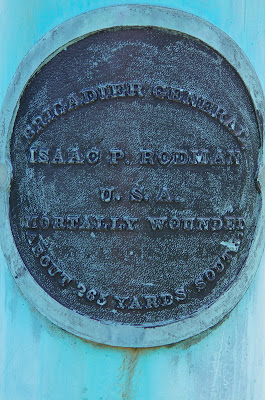Isaac P. Rodman, the eldest son of Samuel and Mary Peckham Rodman was born in South Kingstown, Rhode Island, August 18, 1822. He was engaged in a number of business ventures including the woolen manufacturing business, S. Rodman & Sons, with his father and younger brother Rowland before the civil war. He was also active in state and local politics as the president of the Town Council of South Kingstown, as a representative in the Assembly of Rhode Island and as a state senator prior to volunteering.
When president Lincoln called for 75,000 troops following the firing on Ft. Sumter in April 1861 Rodman raised a company of men from South Kingstown which became Company E of the 2nd Rhode Island Volunteer Infantry. The 2nd Rhode Island was engaged at 1st Bull Run where Captain Rodman won "high distinction for his steadiness and bravery". On October 9, 1861 he was promoted to Lt. Colonel of a new regiment the 4th Rhode Island. On October 30, 1861, the date the regiment mustered into federal service Rodman was promoted to Colonel.
Rodman was with fellow Rhode Islander, Ambrose E. Burnside and the North Carolina Expeditionary Force where he participated in the Battles of Roanoke Island (February 8, 1862), New Bern (March 14, 1862) and Fort Macon March 23-April 26, 1862). His "gallant and distinguished conduct" in these engagements earned him a promotion to Brigadier General of Volunteers effective April 28, 1862.
After the Battle of Fort Macon, Isaac Rodman contacted typhoid fever which forced him to leave his command and return to Rhode Island to recuperate. When Major General Burnside organized the 9th Corps in July 1862 he called upon Rodman to return and take command of the 3rd Division. Though not fully recovered from typhoid fever Rodman returned to the army, against his doctors orders, and assumed command of the 3rd Division, 9th Corps on August 6, 1862. Brigadier General Rodman was leading this division during the afternoon final attack of the 9th Corps at the September 17, 1862 Battle of Antietam when he was mortally wounded in the chest. He died at a field hospital near Sharpsburg, Maryland on September 30, 1862. His remains were taken back to Rhode Island and interred in the Rodman family cemetery, in Peace Dale, Rhode Island.
Isaac Rodman Mortuary Cannon, Antietam National Battlefield
According to Memories of Rhode Island Officers, "Rodman exhibited even more than his usual bravery and coolness (at Antietam). Though in feeble health and much exhausted from five days and nights of extraordinary service, he kept in the saddle from early dawn till sunset, when he fell pierced by a minie ball through the left breast."
Inscription on Mortuary Cannon
When Major General Ambrose Burnside reported Isaac Rodman's death to the 9th Corps he had this to say about his friend and fellow Rhode Islander: "One of the first to leave home at his country's call General Rodman, in his constant and unwearied service, now ended by his untimely death, has left a bright record of earnest patriotism undimmed by one thought of self. Respected and esteemed in the various relations of his life, the army mourns his loss as a pure hearted patriot and a brave, devoted soldier, and his division will miss a gallant leader who was always foremost at the post of danger.
Incidentally Isaac's younger brother Rowland Gibson Rodman a Captain of Company G, 7th Rhode Island Volunteer infantry was wounded in the shoulder at the December 13, 1862 Battle of Fredericksburg. The wound was severe enough that it ended his army career.



